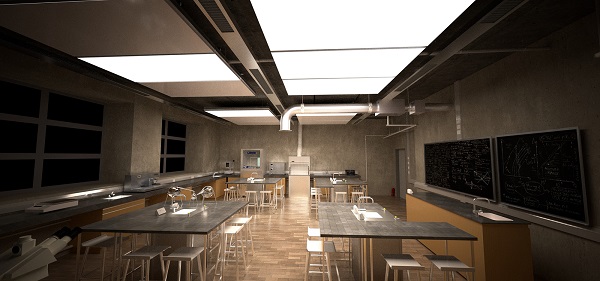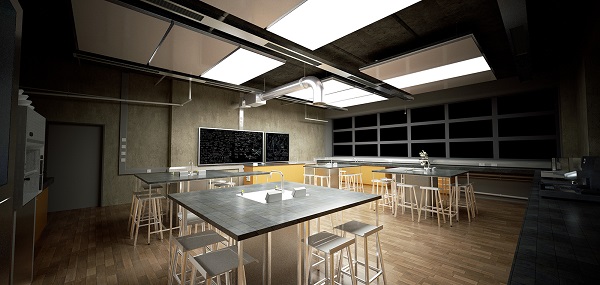-
Ceiling panels covered in special heat-conducting film function well below the dew point, and use up to 70% less energy.
-
The modular ceiling system can be used to cool, heat, illuminate, and simultaneously improve the acoustic properties of internal spaces and open areas.
-
Interpanel GmbH, a spin-off company established by the Fraunhofer Institute for Building Physics IBP, plans to start selling the multifunctional cooling and heating system in mid-2017.
Poorly maintained air conditioning systems cause mold or other bacteria to spread; they often also generate drafts and are costly to operate. An alternative technology that uses ceiling panels covered in special heat-conducting film operates well below the dew point. Designed by Fraunhofer researchers, the system offers hygienic cooling even in tropical climates, and uses up to 70% less energy. The multifunctional system will be launched at the BAU trade fair from January 16-21, 2017 as part of the Fraunhofer Building Innovation Alliance’s special show, “Fraunhofer CityLaboratory – creating living spaces” (Hall C2, Booth 538).
 |
|
The innovative cooling element reduces perceived temperature in just three minutes. Besides ambient climate control and lighting, the modular system also improves acoustics.(Photo courtesy of Alexander Buff / Fraunhofer IBP) |
Comfortable temperatures with minimal energy consumption
Researchers at Fraunhofer IBP have developed innovative technology that prevents condensation: a special heat-conducting polymer film. When applied to multifunctional ceiling panels, it has the same effect as insulating glass and allows the panels to function well below the dew point without condensation forming. “Our system is unique in the world,” says Alexander Buff, a scientist at Fraunhofer IBP in Rosenheim. The concept was funded by the Fraunhofer Venture Group (see link below), and a patent is pending. Now a team of six, the scientists have been awarded level I EXIST start-up research funding from the German Federal Ministry of Economy and Energy. The team’s Clear Sky Cooling project is currently being spun off from Fraunhofer under the name Interpanel GmbH, with Alexander Buff as its CEO, and the multifunctional cooling and heating system will be available from mid-2017.
Multifunctional, upgradable modules
What makes the technology special is that it avoids the problem of the dew point, and it is multifunctional. Around two square meters in size, the modules can be combined flexibly. As efficient LED lighting panels, they save energy. With its acoustic activation, the system simplifies interface planning. High-density modularity reduces the system’s overall size and saves on installation time. Sheets of film are individually printable and easy to replace. The long-lasting modules can be taken down and re-installed elsewhere.
 |
|
Ceiling-wide activation ensures healthy ambient climate control regardless of the dew point.(Photo courtesy of Alexander Buff / Fraunhofer IBP) |
Ceilings fitted with the system achieve much the same refreshing effect as a starry sky on a warm summer night: once the sun goes down, the air feels pleasantly cool because the clear, cold night sky draws away the heat, causing an instant drop in perceived temperature. The ceiling panels work according to the same physical principle: their cooled surfaces absorb the heat given off by people in a process that is direct, noiseless, and free of drafts. Ceiling panels can be cooled at the push of a button or by means of a motion sensor, and in around three minutes they generate a pleasant ambient climate in the room beneath them – as beneath a cool night sky. Because it circumvents the problem of the dew point, the system can also be used in open spaces such as industrial workplaces or open-plan offices. Instead of causing cold air to swirl around in a space, the panels absorb the naturally radiated heat only where comfort is needed. Such zonal usability makes Clear Sky Cooling particularly energy-efficient. It is especially suited for use in health-related environments such as hospitals, physiotherapy centers, and fitness studios, as well as in open-plan offices, conference centers, and manufacturing facilities. The system works independently of surrounding drafts and humidity, and so its operation is nearly safe and maintenance-free.
At the BAU trade fair from January 16-21, 2017 in Munich, the future Fraunhofer spin-off Interpanel GmbH will exhibit its innovative technology at the Fraunhofer Building Innovation Alliance’s special show, “Fraunhofer CityLaboratory – creating living spaces” (Hall C2, Booth 538).





 CN
TW
EN
CN
TW
EN







